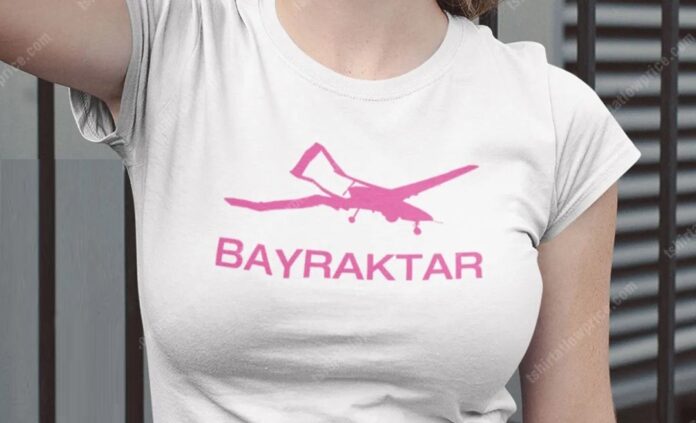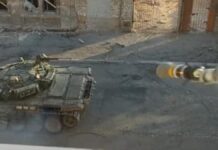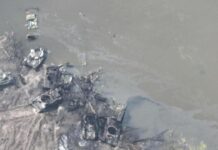
Ankara, which has good relations with both Moscow and Kyiv, has sold dozens of its combat drones to Ukraine since 2019.
During Russia’s war on Ukraine, video footage has circulated on the internet showing the Turkish combat drone Bayraktar TB2 successfully striking the Russian army.
Байрактар знищує ЗРК "Бук" російських терористів. pic.twitter.com/CqN3iNZ1Nf
— Промисловий Портал (@ua_industrial) March 10, 2022
But as so often during heightened conflicts, it is hard to distinguish between factual events and misinformation – some videos of the drone attacks have already been exposed as the latter.
Given the chaotic events on the ground, it is almost impossible to assess how often and how successfully Ukraine has utilised its Turkish drones so far, Mauro Gilli, senior researcher in military technology and international security at ETH Zurich, told Al Jazeera.
Ruskies running for cover after more Ukrainian drone strikes #DroneAttacks#UkraineWar #BayraktarTB2 pic.twitter.com/yKe2eoc5bR
— Silverlight001 (@Silver_osc) March 11, 2022
“There have been some video footages allegedly showing the employment of the TB2. Of course, information at this point is fragmented, and it needs to be taken with caution.
“We do know that Ukraine bought some TB2 over the past years and that Turkey and Ukraine signed an agreement for the production within Ukrainian borders of the TB2 – but, as far as I know, production had not started yet.
Like in #Syria, #Karabakh and #Libya, Turkish #BayraktarTB2 drones are making their mark in #Ukraine, destroying advanced #Russian weapon systems worth some $600 million based on footage released. pic.twitter.com/pHnhfAKfni
— Clash Report (@clashreport) March 14, 2022
“Allegedly, some transport aircraft delivered some drones shortly before the beginning of the hostilities with Russia,” Gilli said.
Since 2019, Kyiv has bought dozens of drones from Ankara.
Since the first day of the war, #BayraktarTB2 UAVs of the #Ukrainian Army have destroyed #Russian air and missile defense systems, command posts, electronic warfare centers, logistics convoys. pic.twitter.com/cKBo1eO1hN
— Clash Report (@clashreport) March 14, 2022
They have also been used in Libya and in last year’s battle between Azerbaijan and Armenia over Nagorno-Karabakh – when the drones were used by Turkey’s ally Baku.
“The TB2 produced by the company Bayraktar is one of the two prominent armed drones produced by Turkey [the other being the Anka produced by Turkish Aerospace Industry]. It is cheaper than other Western models, but it has a good performance in key parameters [range, altitude as well as sensors and communication system],” Gilli said.
But given Russia’s strength of forces, what impact drones might have in Ukraine?
“It will very well depend on Russian air defences. Drones like the TB2 are vulnerable to anti-air defence systems. To be effective, they need to be employed in a savvy way, in coordination with other electronic warfare systems that ‘blind’ enemy radars and through appropriate tactics,” Gilli said.
“However, against capable enemies, these technologies and tactics might not be sufficient. In Libya, Russian forces figured out effective ways to counter Turkish tactics and shoot down their drones. The same [has been] observed in Syria and Nagorno-Karabakh,” he added.
“That Ukraine could strike some Russian ground forces with TB2 suggests either that Russian forces are advancing without air defence – which is very well possible, in light of the logistical and organisational problems Russia has encountered so far. Or that Ukrainian forces acquired also advanced electronic warfare systems. Whether they will have a systematic effect on the outcome of the war, it’s hard to say, but I tend to be sceptical,” said Gilli.
Regardless of their impact, the use of drones inevitably raises Turkey’s profile.
Turkish President Recep Tayyip Erdogan has maintained amicable relations with Russia and Ukraine for years, but Moscow’s invasion has complicated his balancing act.
“Turkey and Ukraine were enjoying good and friendly relations before the war,” Erdi Ozturk, associate professor in politics and international relations at London Metropolitan University, told Al Jazeera.
“Turkey has strongly supported Ukrainian independence in the 1990s. After its independence, they worked closely to establish a stable environment in the Black Sea [through] economic and military cooperation,” he said.
As far as Ankara is concerned, Russia is unlikely to change this dynamic.
“Turkey has been playing an active role with its drones, and eight trucks of humanitarian aid have been delivered to local authorities in Ukraine and neighbouring Moldova. Furthermore, in an hourlong call with Moscow [last] Sunday, Erdogan appealed for an urgent general ceasefire,” said Ozturk.




